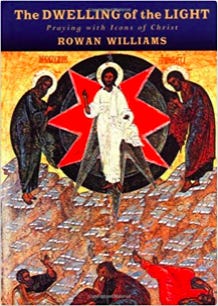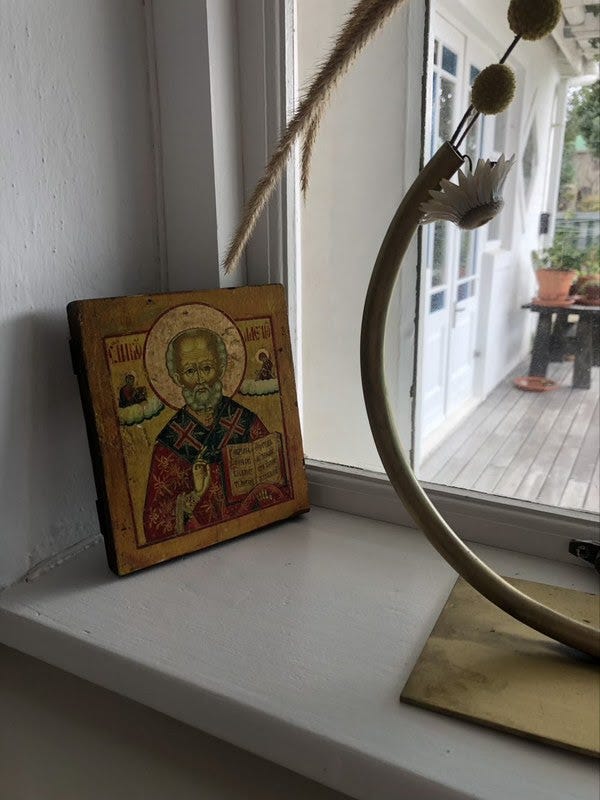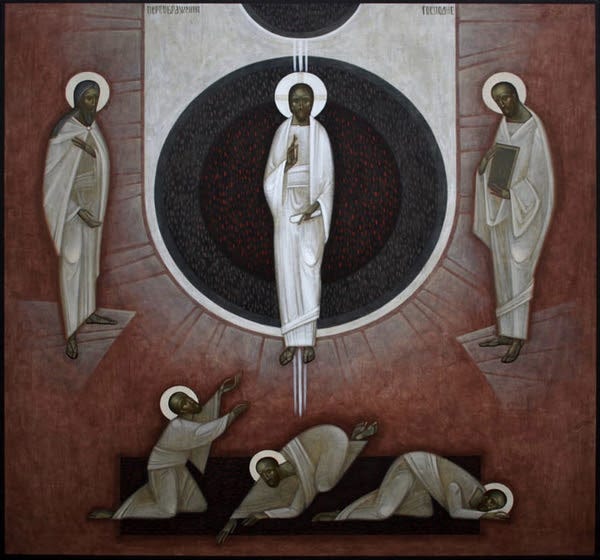The Lectio Letter - Issue #31 - The Anger of Jesus
“The Christian does not think God will love us because we are good, but that God will make us good because He loves us.”
― C.S. Lewis
Welcome to Issue #31 of the Lectio Letter. This members-only newsletter is filled with music, film and food suggestions, links, and at least one original article by me.
This edition’s article comes from a transcript of a “zoom sermon” I gave for friend at Hillview Community Church in Scotland, which has been (masterfully) editted into something much more readable by my good friend Jilly Schien. Something I should have had her do before I gave the sermon 😂!
As ever, If you think this or any previous articles would be interesting or useful to those you know, please feel free to forward this email and encourage them to sign up too.
As a member, you get access to all the previous issue’s even if you only just signed up recently. Click on a previous issue and then follow the ‘already a member’ link and it will email it straight to your inbox!
Final PSA: These lectio’s are loooong and so it seems many people are missing out on the whole thing because of Gmail ‘clipping’ them. You can see at the bottom of the email if it says “message clipped”, then click “View entire message” to see it all. If you don’t see my signature at the bottom, you are not getting it all.
Status Board
Work: We continue to track along with the folks in the M.A. now we are back in Cape Town. We returned, as everyone does, to to-do lists as well as wonderful re-connections with friends in Masi and the surrounds. Much of that got cut short due to a further lockdown level 4 here in South Africa which bans all social gathering. This however, gave me slightly more time to delve into an audio course from Eugene Peterson called SoulCraft from Regent Audio. Peterson’s words, written and spoken are so often an incredible balm to a hurried and harried christian life. I can’t recommend it enough. I am also eagerly awaiting getting stuck into his biography that was recently warmly recommended called a Burning in my bones.
Music: I’ve been continuing to capture new music I’m listening to in my monthly playlists. They are not in any order and often very different in genre from one track to the next, but here’s the one from June 2021
June 2021 - playlist by Liam Byrnes | Spotify
Listen on Spotify:
Here are a couple of my favourites
Everything New (Sessions)
Kosemura: Asymptote
Food
We recently made this fantastic Korean fried chicken recipe, with boneless chicken thigh (less cooking time that the wings in this recipe), and it was great!
Best Korean Fried Chicken Recipe - How To Make Korean Fried Chicken
Get ready for extra-crispy Korean Fried Chicken with this recipe from Delish.com.
This week, we’re going to attempt this sumac roasted fish. If it’s good then we’ll let you know, if you don’t hear anymore, then you know how it went!
Mahi ba Somagh (Sumac Roasted Fish) Recipe - NYT Cooking
This flavorful and bright preparation of mahi, which means fish in Persian (not to be confused with mahi-mahi), comes together quickly In keeping with the sour-leaning Iranian palate, a generous sprinkling of tart sumac and a drizzle of fragrant orange and lime juices coat butterflied whole fish If your sumac has been languishing in the back of the spice drawer for some time, get a new jar
Reading: I’ve been continuing to read at a slow pace: Faith Formation in a Secular Age which is a little tough going but has huge implications for discipleship in our age.
I’ve also been enjoying a re-work of Meister Eckharts short poems in a book called “Book of the Heart” by Jon M. Sweeney and Mark S. Burrows
Finally, I haven’t started this yet, but as mentioned above, I’m looking forward to getting into A Burning in my bones, a biography of Eugene Peterson whom I’m freshly appreciative of (see ”’the SoulCraft course I mentioned above).
The Anger of Jesus | A Sermon on John 2:13-16
There are seven “signs” in the Gospel of John that strongly suggest Jesus is God. One of these, Jesus cleansing the temple, is often overlooked or questioned. Perhaps this is because Jesus cleansing the temple doesn’t seem particularly miraculous, or maybe because becoming angry is regarded as an embarrassingly human trait? Anger is considered by many to be a negative and socially inappropriate emotion, and this makes it easy (and perhaps convenient) to ignore or brush over this awkward gospel account of Jesus expressing anger.
How do you feel about getting angry? How does Jesus getting angry make you feel?
A number of years ago Mark Galli, a journalist for Christianity Today, wrote a book called Jesus Mean and Wild: The Unexpected Love of an Untameable God. In addition to being a good marketing ploy, the title confronts us with a question about Jesus. Have we domesticated Jesus to the point where he is simply meek and mild? Our domestication of Jesus is strongly confronted when we are faced with the account of Jesus’ anger while cleansing the temple.
What makes Jesus angry? As Christians, we affirm that Jesus is fully God and fully human, so what does God get angry about?
We need to pause for a minute here, because many of us have had painful experiences of anger directed towards us in harmful or destructive ways, and it is easy to project these experiences onto God, expecting God might act towards us in that same way. Floyd McClung, our dear friend and mentor, wrote a popular book called the Father Heart of God. Knowing how easy it is to project our pain experiences onto God, Floyd sought to present a clear picture of who God is as the perfect Father. As the writer to the Colossians reminds us, “he (Jesus) is the image of the invisible God.” If we feel confused about who God is, we can look at Jesus as the perfect mirror image of Father.
Let’s consider Jesus’ anger in this context. An experienced Christian counsellor I know once said that “anger is the protest of grief.” Everytime anger erupts, a good question to ask is, “what is this grief over? What has been lost? I think this is a key to see what Jesus is doing here. What is Jesus’ grief over? What has been lost for him?
Before we identify the cause of Jesus’ anger, we need to turn back to the ‘signs’ of John’s gospel for a moment. We tend to become too enamoured with miracles. I love it when something that is unquestionably supernatural breaks into what we otherwise feel is a very mundane and ordinary human life. In our ministry, we have seen people healed and demons cast out, but we can miss the wood for the trees if we only seek the spectacular, surprising or magical moments.
John uses the word, sign. What is a sign for? A sign points to something outside of itself, and directs our attention to that other thing. By its nature, a sign is not the thing itself. As we think of the signs in the gospel of John, we don’t want to become over-enamoured with the signs pointing to Jesus. We want to become enamoured with Jesus.
Colossians 1:17 reminds us of the reality that the whole created world is held together in Jesus Christ. God wants us to see that everything around us is a miracle. Each breath we take is a gift from God, and the world we live in is held together by the very grace of God. Too often, we imagine a “watchmaker” God who sets the world up then sits back with cold indifference. But the God we know in Jesus Christ is intimately connected to every atom of our cosmos. Our world is what we might rightly call a “mundane” miracle.
I wonder, are we missing the “mundane” miracles in our lives? Are we missing the in-breaking moments of goodness, truth and beauty given by God? Maybe they are just a little too slow for us to see them as miracles? But miracles they are.
In Luke chapter 10, the disciples are amazed that spirits submit to them. Jesus rebukes them and continues to rebuke other religious people looking for a sign. Instead, he tells them to “rejoice instead that your names are written in heaven.” Put another way, rejoice that God knows your name and that you are important to Him. This is about a relationship, not power. Seeking signs can lead to us missing the One the signs are pointing to.
Let’s take a closer look at Jesus’ actions in John 2 and why John might be encouraging us to stop and see this sign/action as a glimpse of who Jesus really is…and why we might have much to celebrate over.
13 When it was almost time for the Jewish Passover, Jesus went up to Jerusalem. 14 In the temple courts he found people selling cattle, sheep and doves, and others sitting at tables exchanging money. 15 So he made a whip out of cords, and drove all from the temple courts, both sheep and cattle; he scattered the coins of the money changers and overturned their tables. 16 To those who sold doves he said, “Get these out of here! Stop turning my Father’s house into a market!”
Part of what Jesus is doing is turning up at the right time. God chooses Passover for this act of prophetic anger. For the Jewish people, Passover was the time to remember and celebrate their deliverance from Eqyptian oppression. It is basically a “freedom from slavery” festival, a time when people’s memories are turned to God’s mighty deliverance from their enemies. It was also the time when the people were feeling a deep longing for freedom, this during the Roman occupation of Jerusalem. The Roman occupation was a painful reminder that God’s promise had not been fulfilled. Not only do the Romans have the Jewish people in slavery, but the whole temple system, a place of access to the God who wants to deliver them from slavery, has become a place for financial benefit for those in power.
Historians tell us that when Jesus came to Jerusalem, the outer-court market was a recent addition to the temple. Chief Priest Ananius, who we will meet later in the book of Acts, made this new arrangement to bring the money changers from the bottom of the temple hill into the Gentile court of the temple. For those who visited from far away, instead of bringing your own sheep, you could bring money and exchange that for a sheep in Jerusalem. This was at an elevated price that lined the pockets of the elite.
Matthew tells the same story, but he gives particular attention to the sellers of doves. In Leviticus, we read that doves were what the poor would buy if they couldn’t afford a sheep as their thanks-offering to God. Provision had been made for the outcast, broken and downtrodden poor to come close to God’s presence.
Before we further explore what brought about Jesus’ anger, we need to remember the significance of the temple. The temple was the place where God’s dwelling, rule and reign were made visible on the earth. Solomon, who built the temple, said plainly that no building could contain the God of the universe, but it was the place where God’s realm (heaven) and our realm (earth) overlapped.
Biblical scholars show us that in the Genesis story, the Garden of Eden is the prototype of the temple. If you walked into the temple in Jerusalem, you would see that it is actually modelled after the Garden of Eden itself, with images of trees, flowers, and animals.The whole of creation is like a huge temple, and this is the place God intends to dwell. But we know that something in the story goes terribly wrong, and the tabernacle (and later the temple) are instituted to begin to re-bridge that great divide that has occurred. It points to God’s intention to once again dwell with humans like he did in the Garden. In Revelation, at the end of the story, we see God setting all things right. Revelation 21:22 says “I did not see a temple in the city, because the Lord God Almighty and the Lamb are its temple.”
The story of God is centred around God’s desire to be with hispeople. This then, is the passion of God in the heart of Jesus that makes him angry. This is what has been lost: God being with us.
How does this affect us today? A continual problem that was revealed in the people of God in the Bible is the same problem/temptation that we experience today: idolatry. Idols tempt us because they are, in themselves, not inherently evil. Idolatry is more subtle than outright sin because it takes the good things ofGod and replaces them for God Himself. It makes a good thing an ultimate thing. In ancient times, the human desire to worship often found its expression through the creation of wood or stone carvings of different elements in creation. Most of us aren’t in a culture that carves little statues, but we do live in a world that is continually competing for our affections. We still give our love, our life and our ultimate allegiance to something. Often these are very good things: our work, careers, houses, cars or even something as good as our children /family. When these good things become the focus (disordered) and take the place of God, they become idols.
While idols are subtle mis-orderings of good things, what Jesus is getting angry at here in the temple is the subtlest of idols: religious ones.
For those of us who have been followers of Jesus for quite some time, this is a major way we can fall into deception. Instead of the challenging task of growing in relationship with God Himself, we fill our lives with the things of God and figure that will do. We attend church, go to a Bible study, sing on the worship team or join any number of rotas. All these are good things, but we can become like the Church in Ephesus who are written to by the Spirit in John’s Revelation.
You have persevered and have endured hardships for my name, and have not grown weary.
Yet I hold this against you: You have forsaken the love you had at first. Consider how far you have fallen! Repent and do the things you did at first.
Revelation 2:2-5
“Are we keeping the main thing the main thing?” is the question Jesus’ rebuke at the temple offers us today. Are we living with God or just for God. Many times I have received the tender rebuke of God to return to the heart of the story of God, and to live with God as we seek God’s purposes in our work. Have we put our faith in the good gifts of God, rather than God Himself? We can use religious busyness, indeed religious business, to distract us from the painful and costly claims Jesus makes on us when he invites us into relationship with him.
Eugene Peterson, in his much quoted message paraphrase, gives us these words:
Matthew 11:28-30 “Are you tired? Worn out? Burned out on religion? Come to me. Get away with me and you’ll recover your life. I’ll show you how to take a real rest. Walk with me and work with me—watch how I do it. Learn the unforced rhythms of grace. I won’t lay anything heavy or ill-fitting on you. Keep company with me and you’ll learn to live freely and lightly.”
In verse 18 of John 2, the religious elite ask Jesus:
“What sign can you show us to prove your authority to do all this?”
Jesus answered them, “Destroy this temple, and I will raise it again in three days.”
Jesus’ response scandalises them when he states, more explicitly in Matthew 12, that “something greater than the temple is here.”
John helps us with some commentary in the verses that follow:
21 But the temple he had spoken of was his body. 22 After he was raised from the dead, his disciples recalled what he had said. Then they believed the scripture and the words that Jesus had spoken.
The signs are pointing to Jesus’ resurrection. Jesus is offering us life: His life, abundant life, life that has conquered death and now, as pentecost people,this life lives within us.
The key to our ‘life in Christ’ is that we do all that we are doing withGod, not for God. We have not been invited into a special club. Jesus’ desire, the desire that is grieved and provokes his anger in the temple, is that all nations, all people who feel far from God, all those who feel unqualified and forgotten, would have access to God’s life-giving presence, forgiveness, and friendship. The signs in John’s gospel point to this. In the opening words of John’s gospel, we read that, “The Word became flesh and has made his dwelling among us.” That word dwelling is temple language. God, in Jesus, has come close. As Peterson says, He has moved “into the neighbourhood.”
With God’s life in us, we are God’s presence in our neighbourhoods, cities and nations. Living our lives with God can be a sign to the world that God is nearer than they could ever dream possible.
When we live this life with God and not just for Him, we welcome the poor and the broken. We live as the Church, a signpost that points to a Good King and Saviour in the midst of a world who so desperately needs one.
A final question for you to consider as you enter this week: are you living for God, or with Him? How can you enter this week full of the awareness of the presence of Jesus in you, the One who never leaves or forsakes you, as a sign to the world that God has come near to them, nearer than they could ever dare to dream?
Miscellaneous Link List
The Cross and the Machine by Paul Kingsnorth | Articles | First Things
We must have been fifteen or sixteen when we discovered the church visitor’s book. It was an old … .
There are just so many things to like about Paul Kingnorth’s story above, it’s hard for me not just to pull out quote after quote, but this has to be one of my favourite sections on the two types of Vicar he encountered in his british childhood;
Back then, there were two distinct flavors of Christianity, both of which I tried to avoid. One was the fusty old Church of England variety. You would see this if you had to go to a wedding or a funeral, or when a vicar was invited to give a sermon at school. The vicar would be a slightly Victorian figure, an older man almost dainty in his manners, trying his best to speak in a dying tongue to a generation of kids more interested in their ZX Spectrums. The Victorian vicar would hand out morality lessons from a man who had lived two thousand years ago and whose core imagery might as well have been from Mars: wine presses, fishing boats, vineyards, masters and servants, virgins. The basic pitch seemed best summed up by Douglas Adams in The Hitchhiker’s Guide to the Galaxy, which I’d rather have been reading than listening to a vicar: “One man had been nailed to a tree for saying how great it would be to be nice to people for a change.”
The second flavor was the trendy vicar. Unlike his predecessor, the trendy vicar was plugged into the spirit of the age. He knew that instead of bicycling to Holy Communion through the morning mist, we were watching The Young Ones and playing Manic Miner, and he was on our side. The trendy vicar had a clipped beard and wore jeans and sang folk songs about how Jesus was our friend, and gave awkward, vernacular sermons in which biblical stories were interspersed with references to EastEnders or Dallas or Michael Jackson songs. Despite his good intentions, the trendy vicar was much worse than the stuffy vicar. At least the Victorian sermons were in some way otherworldly, as religion should be. If it was pop culture we wanted, and we did, we were better off sticking with the real thing, which was to say the thing without any Jesus in it.
Nobody Stands Nowhere
Theos think tank helped produce this beautiful and excellent animated short on the reality that “no one stands nowhere”.
In recent years, I’ve come to appreciate eastern orthodox icons, Rowan William’s small book has helped me in this. In fact, a friend recently gave me this Icon of Saint Nicholas while I was in Istanbul as a reminder to ‘keep the faith’ in connection with his strong preservation of Orthodox theology at the council of Nicea-Constantinople against Arius. It now finds pride of place in our home.
Saint Nicholas
But, I’ve always thought it was more of an ancient practice, but I have come across these more recent eastern European artists who are doing incredible iconographic art.
Saint Nicholas
What is man
Khrystyna Yatsyniak on Instagram here.
The Transfiguration
Khrystyna Kvyk on Instagram here.
Warren Buffett Believes 3 Decisions in Life Separate Those Who Succeed From Those Who Fail | Inc.com
While most of us will fail at some point, taking a dose of Buffett’s advice will steer us in a new direction.
Invest in yourself
Measure your success by your “inner scorecard”
Your life’s success should be defined by one four-letter word.. Love.
15 Things I Wish Someone Had Told Me When I Started Cooking | A Cup of Jo
Fifteen hard-earned kitchen tips and tricks.
Some good ones here are:
1. Don’t make recipes (or trust cookbooks) that have overly cutesy recipe titles like “Struttin’ Chicken.”
3. Some Type-A behaviors worth stealing: Do everything you can in advance when you are having people over for dinner.
5. Meat will never brown properly if you add it to the pan when it’s freezing cold and wet. It should be patted dry and room temperature.
6. Add acid. A drizzle of vinegar, a spoonful of tangy buttermilk or plain yogurt, a simple squeeze of lemon or lime will always add brightness to an otherwise boring and flat dish.
13. Salt the water.
14. You will never regret ending the day with a sit-down meal.
Almost finally, here’s a fantastic Nouwen quote I’ve been thinking over on the nature of hospitality:
“The paradox of hospitality is that it wants to create emptiness, not a fearful emptiness, but a friendly emptiness where strangers can enter and discover themselves as created free; free to sing their own songs, speak their own languages, dance their own dances; free also to leave and follow their own vocations. Hospitality is not a subtle invitation to adore the lifestyle of the host, but the gift of a chance for the guest to find his own.”
―Henri Nouwen, Reaching Out: The Three Movements of the Spiritual Life
And… finally, as has become tradition here on the Lectio letter, a little light hearted animal humour ;)
Aaaand thats it…
Liam























